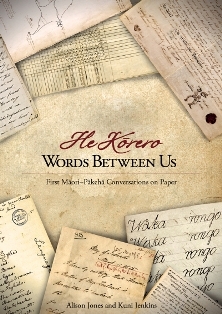Book Review: Alison Jones and Kuni Jenkins, "Words Between Us — He Korero: First Maori-Pakeha Conversations on Paper", Wellington: Huia Publishers, 2011

Alison Jones and Kuni Jenkins, Words Between Us — He Korero: First Maori-Pakeha Conversations on Paper , Wellington: Huia Publishers, 2011 Words Between Us was published late in 2011, just as the final touches were being put to my own The Meeting Place: Maori and Pakeha Encounters, 1642-1840 . That was too late to even note the publication of this new work. It is only now, therefore, that I have had an opportunity to read the Jones and Jenkins book. I’m pleased I have done so. Some books can be a chore to read. This is not one of them. The story of early Maori engagement with writing is told with considerable skill. Examining several copybooks in which Maori boys learned to write at one of the missionary schools in the 1820s set the authors off on a journey to discover how Maori first encountered writing and what it might have been like ‘to take up a European technology that, by some obscure power, seemed to be able to speak in the language of the local people’ ...